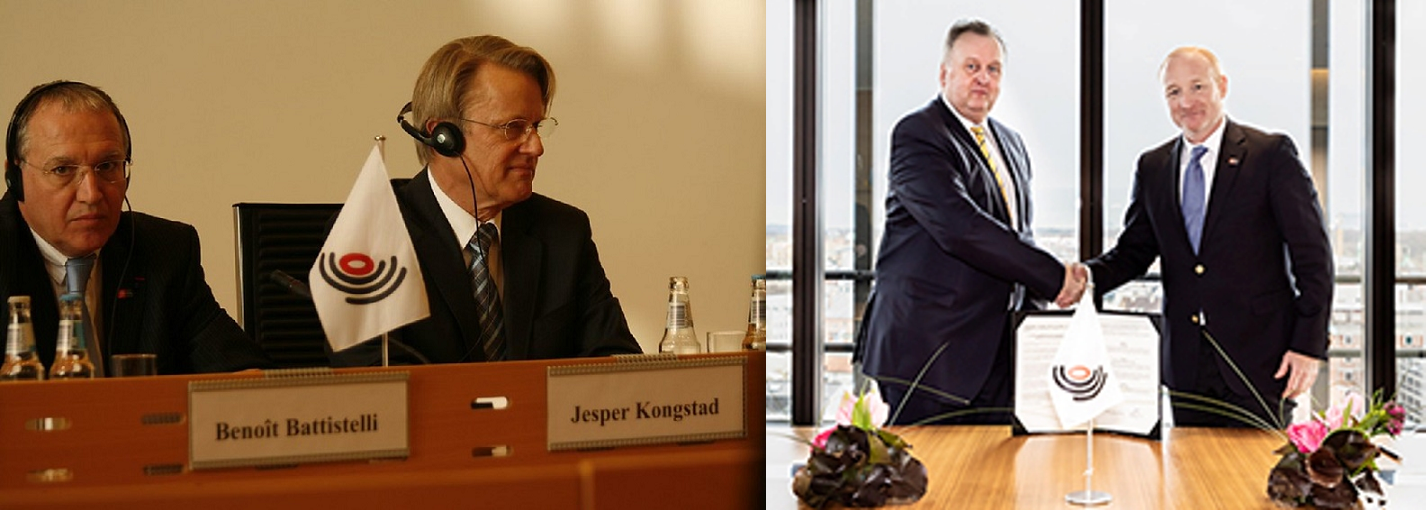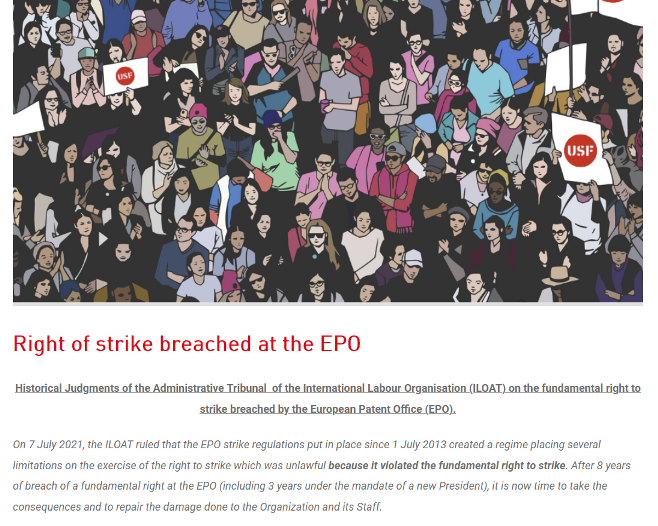

Benoît Battistelli and Jesper Kongstad have been replaced by António Campinos and Josef Kratochvíl.
But has anything of substance really changed? EPO insiders remain sceptical
With this part we have finally reached the finishing line of our marathon series about the EPO's "Strike Regulations" - a key component of Battistelli's sinister plan to deprive EPO staff of their fundamental right to freedom of association.
[PDF] of 7 June 2013 were incompatible with the obligations of the EPO's member states to uphold and protect the fundamental rights of EPO staff.
"It took just over eight years until justice was finally done when Battistelli's "Strike Regulations" were struck down by the ILOAT on 7 July 2021."But due to Battistelli's nefarious influence over the organisation's governing body, these inherently flawed regulations were rubber-stamped by the Administrative Council - which gave its "unanimous" endorsement to decision CA/D 5/13 [PDF] on 27 June 2013.
It took just over eight years until justice was finally done when Battistelli's "Strike Regulations" were struck down by the ILOAT on 7 July 2021.
There can be little doubt that the judgments of the ILOAT's 132nd and 133rd Sessions amount to a damning verdict on "le Système Battistelli" and the toxic management culture which held sway over Europe's second largest international organisation between 2010 and 2018.
As the EPO staff union SUEPO put it succinctly:
"What was once a model organisation for Europe has revealed itself as an institution that has breached the fundamental rights of its employees – for more than eight years."

The European public sector union USF reported on the ILOAT Judgments of the 132nd Session which confirmed serious and persistent breaches of the fundamental rights of EPO staff over a period of eight years.
"However, at the 168th and 169th meetings of the Administrative Council in October and December 2021, there were no signs that the gravity of the situation had registered with the Council delegates."The ILOAT judgments which rescinded the EPO's "Strike Regulations" and "Social Democracy" have belatedly revealed the severe deficiencies in the organisation's governance and management culture and finally exposed them to the light of public scrutiny.
However, at the 168th and 169th meetings of the Administrative Council in October and December 2021, there were no signs that the gravity of the situation had registered with the Council delegates.

At the meetings of the Administrative Council which took place in October and December 2021, there were no signs that the gravity of the situation had registered with the Council delegates.
"The current "PR strategy" appears to be to depict the "Strike Regulations" and "Social Democracy" as unfortunate blunders by a "rogue President" who has long since departed."But this is an unacceptably simplistic and sanitised narrative. It conveniently omits any mention of the pivotal roles played by the Administrative Council and the EPO's dysfunctional internal justice system in this grotesque fiasco.
In the meantime, many of the Council delegates responsible for the adoption of Battistelli's "Strike Regulations" in June 2013 and "Social Democracy" in March 2014 are gone.
Some have sailed off into the sunset of retirement while others have been promoted to new positions in the civil service of their home countries and are no longer responsible for European "IP" affairs.
It should also be recalled that some of the delegates responsible for rubber-stamping these Orwellian measures have been prodded into early retirement or resignation after becoming implicated in serious irregularities on their home pitches.
"With the passage of time, a lot of new faces have appeared on the Council."Those who remain from the "old guard" of the Battistelli era seem to be busy covering their tracks and insisting to anybody who will listen to them that there is nothing amiss and that everything is hunky-dory in the never-never land of EPOnia.
With the passage of time, a lot of new faces have appeared on the Council. However, it is extremely doubtful as to whether these newcomers - in particular the fresh faces from the EPO's "captured states" - are adequately briefed and properly informed about the mess that their predecessors have left behind for them to clear up.
One thing is certain: Battistelli's inglorious exit from the EPO in 2018 did not resolve the organisation's governance crisis which continues to fester under his anointed successor, António Campinos.

Battistelli's inglorious exit from the EPO in 2018 has not resolved the organisation's governance crisis.
Years after the departure of president Battistelli at the EPO, the ILOAT cases keep unveiling details about the climate of fear and harassment under his presidency which have been so often described by staff members. Although he was succeeded in July 2018 by António Campinos, one of Battistelli’s closest allies Elodie Bergot, who used to be Battistelli’s principal director for human resources, is currently chief corporate policies officer. Some have linked the recently announced reshuffle at the EPO, in which Bergot will apparently face a considerable loss of influence, to the ILOAT decisions.

Preparations are underway to commemorate the 50th anniversary of the EPC, but as long as Battistelli's "toxic" legacy continues to plague the organisation, there doesn't seem to be a lot to celebrate.
epo.org link), or whether they will finally manage to pull their heads out of the sand and begin to tackle the manifold problems facing the European Patent Office after more than a decade of chronic mismanagement and cronyism.
"One thing is certain: Battistelli's inglorious exit from the EPO in 2018 did not resolve the organisation's governance crisis which continues to fester under his anointed successor, António Campinos."If the Council fails to step up to the plate, it is more than likely that the EPO will soon find itself engulfed by a new wave of unrest - especially now that the ILOAT has confirmed that staff of international organisations enjoy the fundamental right to "freedom of association" and do not need to beg permission from their employer to engage in "industrial action"! ⬆